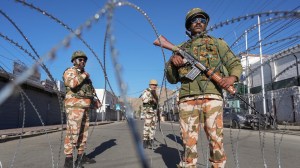From official bias and socio-cultural norms to the absence of strong deterrent laws, the Ministry of Panchayati Raj panel has identified several reasons why male relatives of elected women representatives in the panchayati raj system are able to act as proxies on their behalf.
The committee, headed by former Mines Secretary Sushil Kumar, submitted its report recently. The ministry has said it will take measures to implement its recommendations, which include policy interventions, structural reform and “exemplary penalties”, to check the practice of ‘Pradhan Pati’, ‘Sarpanch Pati’ or ‘Mukhiya Pati’.

The committee, which was constituted in September 2023 as a follow-up action to a Supreme Court order dated July 6, 2023, held four regional workshops across the country to study the issue. Representatives of 14 states – Madhya Pradesh, Tripura, Arunachal Pradesh, Manipur, Meghalaya, Mizoram, Sikkim, Himachal Pradesh, Jharkhand, Rajasthan, Uttar Pradesh, Andhra Pradesh, Karnataka and Kerala – participated in these workshops.
Story continues below this ad
“Our detailed interactions with the state governments and field visits involving interaction with EWRs (Elected Women Representatives)/Women Pradhans, actually, validated the findings of various studies quoted in this report; but additionally, this also offered us (the opportunity) to receive and incorporate specific suggestions for consideration of the planners and policy formulators in the government,” the committee noted in its report.
The key findings/learnings from the workshops and field visits held by the panel and from their interactions with the women panchayat members:
* Lack or inadequate experience of political leadership
The panel notes that newly elected women representatives “lack exposure and experience in learning the ropes to effectively discharge their new roles and responsibilities as local self-government leaders across all three-tiered Panchayati Raj System, especially at the GP (gram panchayat) levels”.
* Gender-Based discrimination
The women representatives “continue to face discrimination in the sense of being ignored and bypassed in official, semi-official and even informal meetings by their male ERs (elected representatives)/peer-elected representatives, and as if taking their cue, even the male officials manning the GP machinery also do the same, in generally preferring to interact with male ERs”, says the committee. “This fosters the perpetuation of the system of Sarpanch/Pradhan Patis, depriving EWRs of their newly found representative voice and leadership in public affairs, thereby, violating their constitutional rights.”
* Prevailing patriarchal norms and practices
Story continues below this ad
“The traditional rural society continues to display centuries-old entrenched patriarchal mindsets, and rigid socio-cultural norms such as observing variants of the ‘purdah’ practices – women covering their heads and even putting a sort of a veil before male peers, more so if they are elders and in public places,” says the report. “… as an extension of such mindsets and socio-cultural manners, they (the women) are required not to speak out in male gatherings in general and this orientation ends up being extended to the panchayat and gram sabha meetings”.
* Political pressure
“Instances abound where the EWRs are subjected to disguised and open threats, coercion and even violence sometimes from the political opponents and dominant groups, and they even resort to using ‘No Confidence Motion’ as a pressure tactic and a weapon to oust them from their seats, cutting their electoral terms,” as per the report.
* Socio-economic and cultural disadvantages
“The EWRs already face the disadvantage of belonging to the group of marginalised sections in the rural areas; additionally, other elements such as belonging to the SC/ST/Minority/Disability categories further aggravate their vulnerabilities as village leaders,” says the committee. “Pressure of balancing their public life with domestic responsibilities such as being homemakers and caregivers causes huge expectations, and multiple burdens to discharge these multiple and often conflicting roles.”
Story continues below this ad
It further says: “Due to socio-cultural reasons, combined with lack of education and experience and subsidiary/subject partner roles assigned… the EWRs are hesitant in taking financial decisions independently; this leads to their being dependent on their husbands/male relatives and restricts their developing an independent mindset and some measure of autonomy in independent action.”
* Lack of training or mentorship
“The EWRs in most panchayats face lack of or limited opportunities and access to rapid and customised capacity-building training which can make them effective political leaders; additionally, they have very limited access to mentors who can advise and guide them in their new roles,” the committee notes.
* Rotational reservation
Questioning the concept of rotational reservation where a seat is kept aside for women for only five years, the committee says, “it is too short a gestation period to enable them to learn their challenging roles as change agents and simultaneously seek to consolidate their knowledge and experience in providing effective local governance”.
* Absence of deterrent laws or penalties
While “some beginnings have been made to formulate rules and enact law to punish male relatives who de facto run panchayats”, the committee says these are not enough. “There is a tendency amongst male relatives to compromise the de jure roles assigned to EWRs.”

































